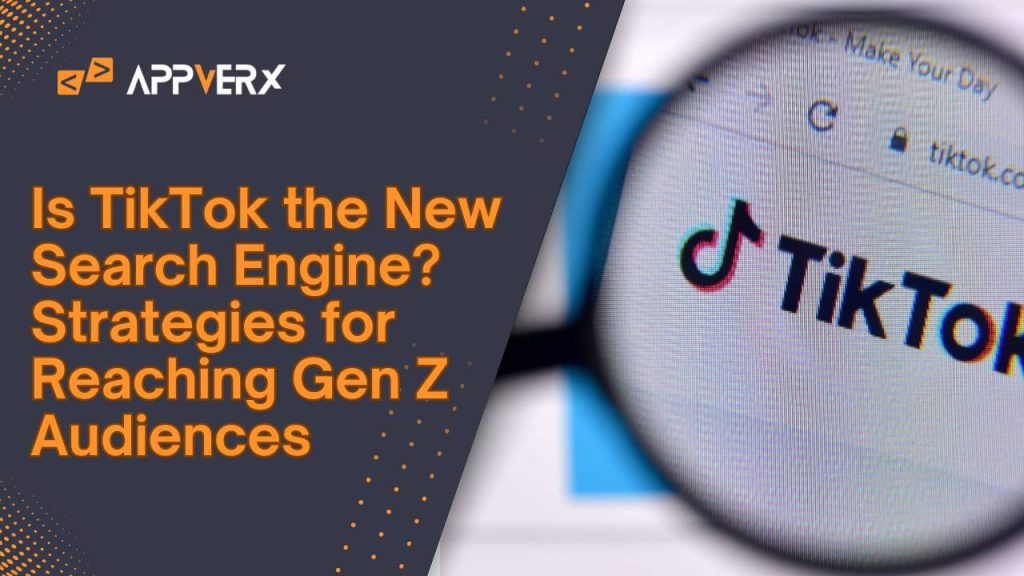In recent years, TikTok has emerged as a powerhouse in social media, captivating the attention of millions worldwide with its innovative approach to content creation and consumption. With its explosive growth, TikTok has not only revolutionized how we entertain ourselves but also how we seek and discover information. In this blog, we’ll explore the intriguing question: Is TikTok the new search engine? More specifically, we’ll explore the platform’s appeal to Gen Z and strategies for effectively engaging with this audience.
Why is Gen Z Turning to TikTok for Search?
Preference for Visual Content
Gen Z, born roughly between the mid-1990s and early 2010s, has grown up in an era dominated by digital media. Unlike previous generations, Gen Z strongly prefers visual content, finding comfort and familiarity in the format of short-form videos. This preference contrasts sharply with traditional text-based search engines, where most results are presented in written form. For Gen Z, video content is not just a means of entertainment but also a primary source of information and knowledge acquisition.
Algorithmic Personalization
TikTok’s algorithmic prowess drives Gen Z’s reliance on the search platform. Unlike traditional search engines, which often present users with a broad array of search results, TikTok employs sophisticated algorithms to curate personalized content feeds tailored to each user’s interests and preferences. TikTok utilizes an intricate analysis of user engagements, encompassing actions like likes, shares, and viewing duration, to curate content specifically tailored to individual preferences. This approach guarantees that users encounter content that resonates with their interests, ultimately enhancing the platform’s appeal and creating an immersive and captivating user journey.
Trust and Authenticity
In an era plagued by misinformation and fake news, Gen Z places a premium on authenticity and trustworthiness. TikTok’s emphasis on user-generated content and peer recommendations resonates strongly with this generation, influencing their search behavior profoundly. Gen Z users are more likely to trust recommendations from fellow users and content creators they admire, leading them to turn to TikTok for entertainment and reliable information and advice.
Is TikTok Truly a Search Engine?
Similarities between TikTok and Traditional Search Engines
At first glance, TikTok is another social media platform focused on entertainment. However, striking similarities between TikTok and traditional search engines emerge upon closer examination. Like conventional search engines, TikTok is a gateway to information, with users actively seeking content that addresses their interests, questions, and curiosities. Additionally, TikTok’s algorithmic infrastructure mirrors that of traditional search engines, playing a pivotal role in delivering relevant and engaging content to users.
Key Differences between TikTok and Traditional Search Engines
Despite these similarities, TikTok stands apart from traditional search engines in several vital ways. Firstly, TikTok’s primary mode of content consumption revolves around short-form video content, as opposed to the predominantly text-based results offered by traditional search engines. Secondly, while conventional search engines are primarily driven by user intent, with users actively seeking out specific information, TikTok thrives on a culture of serendipitous discovery, where users stumble upon content organically as they scroll through their feeds.
Strategies for Reaching Gen Z Audiences on TikTok
Content Creation
To captivate Gen Z audiences effectively on TikTok, brands and content creators must fully adopt and leverage the platform’s distinctive format and storytelling features. Short-form videos are king on TikTok, with users gravitating towards entertaining, educational, and authentic content. By leveraging trending hashtags and challenges, creators can amplify their reach and visibility, capturing the attention of Gen Z users amidst a sea of content.
Influencer Marketing
Recently, leveraging influencer marketing has become a potent approach for brands seeking to establish meaningful connections with Gen Z demographics on TikTok. By partnering with influential creators who resonate with their target demographic, brands can leverage the credibility and authenticity of these creators to promote their products and services authentically. On TikTok, authenticity holds significant importance, and brands that place a premium on authentic partnerships with influencers stand a better chance of garnering the trust and commitment of Gen Z consumers.
Community Building
Building a solid sense of community is essential for brands seeking to establish a presence on TikTok. Encouraging user-generated content and participation in challenges fosters a sense of belonging among followers, driving engagement and loyalty over time. Additionally, brands can enhance their visibility and credibility by actively responding to comments, fostering meaningful interactions, and building genuine relationships with their audience.
Conclusion
In conclusion, TikTok’s meteoric rise as a social media powerhouse has sparked intriguing questions about its potential as a new search engine, particularly among Gen Z audiences. By understanding Gen Z users’ unique preferences and behaviors, brands and content creators can effectively leverage TikTok’s platform to engage with this coveted demographic. Whether through compelling content creation, strategic influencer partnerships, or community-driven initiatives, the key to success on TikTok lies in authenticity, creativity, and a deep understanding of Gen Z culture and values. As TikTok continues to evolve and reshape the digital landscape, brands that embrace its potential as a search engine stand to reap significant rewards in the quest to capture the hearts and minds of Gen Z consumers.


